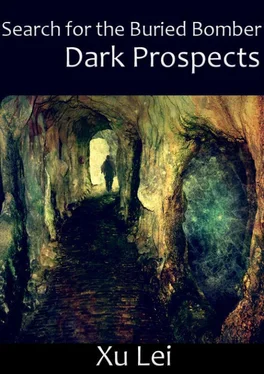“Did you find anything?” I asked them. Ma Zaihai shook his head.
In this we were deceiving ourselves once more. If we were un able to find anything in the light, then how could anything be found in total darkness? But for a man like the deputy squad leader to have thought of this was still rather impressive. The educational level of engineering corpsmen was far from high. At most they would have received a bit of training in their specialty, and that was it. It’s like they used to say about the three treasures of the heroic railway corps: a spade, a pickax, and a worn-out quilted jacket. That’s how the special-engineering divisions were back then.
We gathered together and sat down. Each of our faces wore the same serious expression. “Let’s not panic,” I told them. “From now on, we three will stick close together, so if someone else disappears the rest of us will be sure to know what’s going on!” They both nodded. It was gratifying to see our morale rise. The situation hadn’t changed a bit—my stomach rumbled its intense hunger, and the problems we faced remained legion—but seeing the two soldiers before me I felt secure.
According to materialistic thought, all these strange things we encountered had to have rational explanations, no matter how far-fetched these rationalizations might be. Admittedly, we did often discover that these seemingly forced interpretations were in fact correct, but right now I feared materialistic explanation would simply no longer suffice. I began wondering what would happen if Yuan Xile and Chen Luohu never reappeared. Assuming we made it out of here alive, how would we explain that? The two of them had vanished like ghosts, and where were they now? Had they disappeared completely, or ended up in some other place?
I raised my head and looked around. Not once had I considered the purpose of the iron chamber itself. Based on how it was furnished, it seemed to be either an alternate command center or some kind of safe room, a temporary refuge when the poison mist rose up from the abyss, but was this really the case? It was unimaginably fantastic what the devils had built here. At the end of an enormous natural grotto, we’d found a massive dam and warplane, their presence basically inexplicable. So, given that the Japanese intent was still unfathomable, was it possible this iron chamber was part of some overarching plan?
I stood up and looked at the four walls around me. Suddenly a question appeared in my mind: What was behind them? Concrete? Or something I couldn’t even guess? I ran my fingers along the iron. It was bumpy and rough, as if corroded by some strong acid. Traces of white paint remained, none larger than a fingernail. The wall was ice-cold. As soon as I placed my palm to it, all the heat was sucked from my body. No, I suddenly realized, this was much too cold! The temperature was like that of the underground river, so cold as to be unendurable.
I stuck my ear to the wall. The deputy squad leader and Ma Zaihai stared. “What is it?” Ma Zaihai asked.
I raised my hand to tell him to not make any noise. I had already heard something. At first I couldn’t identify it, then a moment later it dawned on me. It was the sound of water, but not the roar of the river crashing against rock. This was a noise I was familiar with. I come from a family of fishermen. It was the dreary swooshing of the underwater current rubbing against the sides of a boat. In my astonishment I listened again, and indeed I was not mistaken, but I knew it was impossible. The iron chamber was above the generator room. I distinctly remembered the water level was many floors beneath our feet. Even if the sluice gates had closed while we were in here, the underground river would never have risen this high. I related my discovery to Ma Zaihai and the deputy squad leader. They were both perplexed, but when they pressed their ears to the wall, they could hear it as well. Smiling bitterly, Ma Zaihai asked, “So what does this mean? Are we underwater now?”
I grabbed the grapnel and struck it forcefully against the iron wall. There was a bang. Sparks flew off the wall. The sound was low and deep, totally unlike the cry emitted by hollow metal. We truly were surrounded by water. I was stunned. Then I realized that beyond this chamber, beyond the water, there was sure to be another gigantic iron wall. The iron chamber was independent from the rest of the dam and wrapped in a huge iron chute. I slapped myself. How had I not thought of this earlier? What part of a dam’s interior installation would require a thing like this? It was all too simple. As far as I knew, there was only one device that would necessitate just such an iron shell!

CHAPTER 38

The Caisson
On several of the large-scale dams the Japanese built in the thirties and forties—for example the one in Fengman on the Songhua River—the electrical generating units were located roughly thirty feet underwater. During construction, these dams required a special kind of freight elevator—called a “caisson”—to take workers and machinery underwater for installation and generator maintenance. These caissons were generally steel-bar-reinforced iron boxes in vertical cement chutes. Although usually dismantled once testing on the dam had been completed, they sometimes continued to serve as the only way to reach the dam’s lower levels during periods of maintenance and repair. To my knowledge, the only kind of rooms you ever find completely encased in iron are these freight elevators—these caissons. I looked around the room. Was this iron chamber just such a device?
If so, then that triple-proofed iron door was really the entrance to an elevator. My mind seemed to abruptly open up and a number of things occurred to me all at once. The creaking sound I’d heard within the chamber—the one I’d thought was pressure bearing down on the dam—had it been the chamber rubbing against the iron elevator tracks? Could it be that after we stepped into the room, the caisson had actually begun to move? As I listened again to the sound of water outside the chamber, I wondered: In the time it took us to enter the room, could someone have started the thing up? Was it possible that, unknowingly, we’d already descended beneath the water to the dam’s lowest level?
This guess seemed absurd once I thought it all the way through. If it really did happen, how had we completely failed to notice? But as I thought back on what had just taken place, I couldn’t reject the idea. For if it really were as I surmised, then there was now a highly rational explanation for the disappearances of Yuan Xile and Chen Luohu. I focused my attention on a single portion of the iron chamber. Oddly, not once during my recent panic had I taken any note of this area. Why had I never thought of this place when, in actuality, it was the most likely place someone could disappear to? Far, far more likely than the lunchbox-sized ventilation tunnel. I’m referring to the airtight door, of course.
I walked up to it and looked through the small aperture. I could see a faint bit of light, though this light appeared not to be coming in from outside, but rather the reflection of our flashlight beams on the glass. The scene appeared no different than when we had first entered. As I looked at the door, I became lost in thought. This idea was very simple—that people might leave a room through its door. We’d neglected to think of it because we’d believed that outside the door was toxic mist. We believed that if Yuan Xile and Chen Luohu had exited through this door, not only would they have died, but the mist would have invaded the room. We reasoned that since none of us had died, the door must have remained shut, but if the iron chamber had already dropped to the lower levels of the dam, then there was no poisonous gas outside. Therefore, once the emergency light went out, Yuan Xile would have been able to slip through the darkness, open the door, and step through. The same went for Chen Luohu. The problem was whether a certain prerequisite to my whole line of reasoning had been fulfilled: Was there really no poison gas outside the door?
Читать дальше














